Since September, the Q Lab and Mind have been working in partnership to explore how care can be improved for people living with both mental health problems and persistent back and next pain.
On 14 February, 30 people from across health and care (and beyond) will come together to reflect on the work done so far to understand this complex challenge, and how together we can use that learning to develop and test ideas.
The live-blog is our attempt to share the day with those who are not in the workshop but want to get involved and contribute. We’ll capture the content from the sessions, as well as the discussions and stories that we hear. It is written in real-time with contributions from workshop attendees. We encourage you to get involved!
Pithier updates will also be shared from @theQCommunity using the #QLabs. We will feedback any questions and/or thoughts into the workshop.
During the workshop – afternoon sessions
16:30 That’s a wrap!
Thank you to everyone for joining us in Birmingham today. It’s been great to see some familiar faces and meet lots of new ones too.
We’ll be busy writing up the many post-it notes, thoughts and feedback from today and will share a write-up in the next couple of weeks.
In the meantime, don’t forget to check out tweets from the day over at @theQCommunity #QLabs
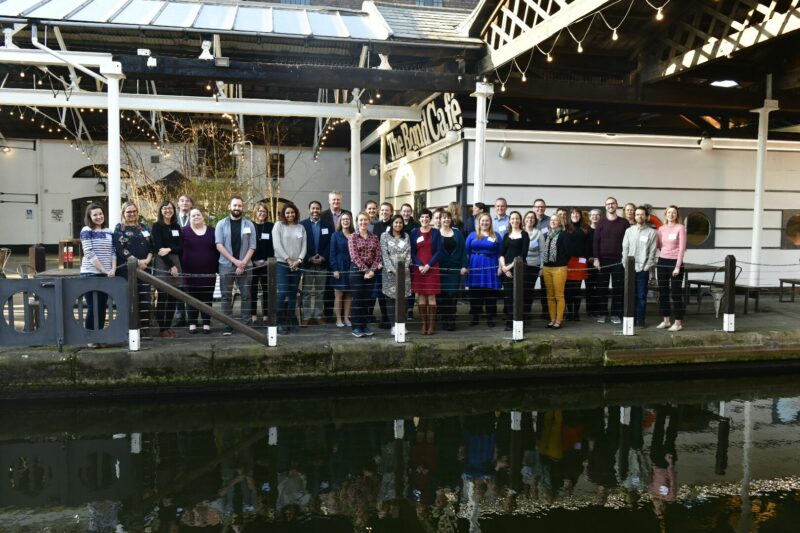
15:56 What next?
After a quick group shot outside (which we’ll share shortly!) we’re back together for the last time today. Tracy, Head of the Q Lab, shares some next steps for our work together.
Collaboration is key to what we do and how the Lab works. In fact the NHS Long term plan uses word collaboration or collaborate 22 times!
“In the Long term plan, ‘integration’ was written 70 times, ‘collaboration’ 22 times. It’s easy to write these words but we should all be heartened by that.” @TracyWebb007 reflects on policy context of #QLabs & @MindCharity work on #mentalhealth & persistent pain pic.twitter.com/JoxsiM6ej1
— The Q Community (@theQCommunity) February 14, 2019
Here’s what we have planned for the coming months:
-
- Our work together will continue and we’ll be drawing on the wealth of knowledge of Lab participants to draw together the research and insights.
- We will draw out actionable insights that support those who want to improve services for people with mental health problems and persistent pain, and identify generalisable learning for improving care across mental and physical health services. This research will be published in May.
- We will be working with the 4 test sites to develop, test and iterate improvements in practice and will be sharing the learning as we go.
- We’ll take forward the work on the 3 opportunity areas identified through the research – potentially bringing together policy leaders, undertaking bespoke research or showcasing great examples. We’ll keep you updated with this and opportunities for involvement.
- More workshops! There will be further workshops and opportunities to connect with others face to face this year. We’ll update as dates are finalised.
15:45 Making new connections
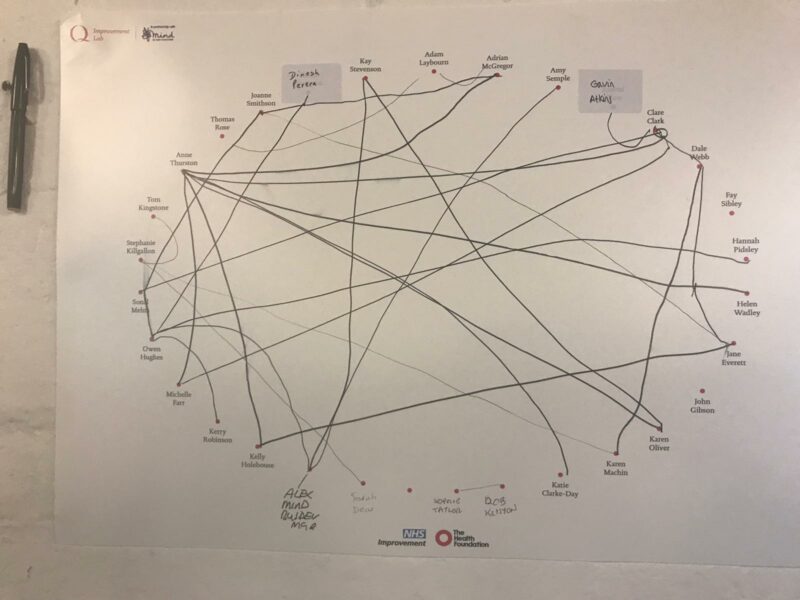
Throughout the day we have been asking people to draw links between themselves and other people as they make new connections. It’s great to see how this has filled up from the start of the day!
Today’s Networking and Connecting Wall @theQCommunity #QLabs event!
“Networking is about connecting people with people, people with ideas, and people with opportunities.”- Michele Jennae pic.twitter.com/MsKQ4WnrmP
— Cynergy (@Cynergycouk) February 14, 2019
15:25 Some feedback on the principles and next steps
We are back in the main room and gathering some group thoughts and feedback on the principles.
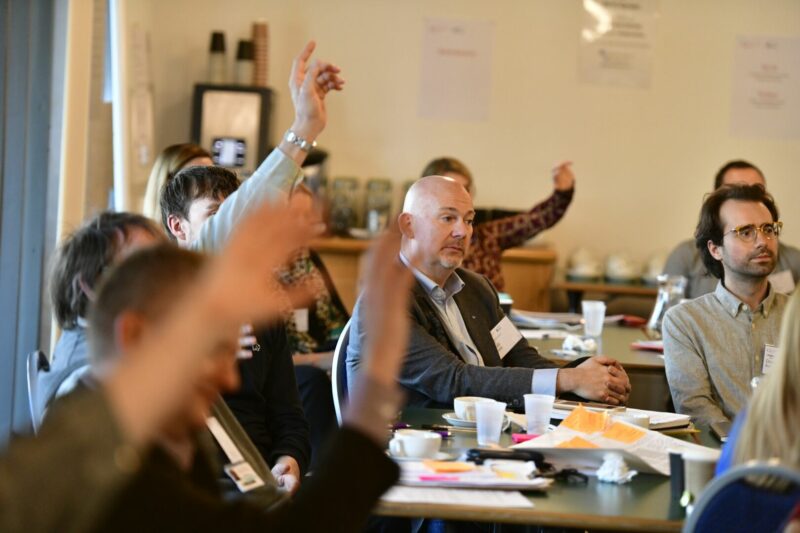
- There’s a mixed reaction to the principles as they currently are and a general consensus that they need quite a lot more work.
- There is work to do on language, the ordering and avoiding overlap.
- It needs to be made clearer and more specific who they are for.
- More focus on evidence of what works and what contributes towards change.
- Perhaps there are a couple missing which could be added to make them stronger.
- However, people see potential and see they could be applied to lots of different areas.
And the result of a quick show of hands on if should we take these forward? The majority says yes! There’s agreement in the room that there’s space to take these draft principles forward, and considering the feedback today, to work on further iterations.
15:00 Into discussions
People have moved into pairs and will then form larger groups to discuss the principles in more detail. Here are some of the questions people are discussing:
- What were first impressions of these?
- Would you add or remove any? If so, which ones?
- What do these principles looks like done well?
- How might they be used?
- Should the Lab invest time in developing these further? If so, how should they look?
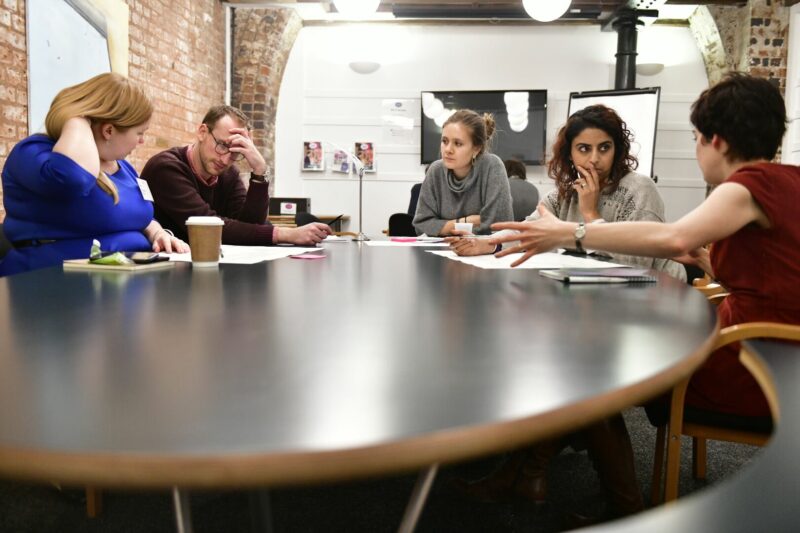
14:40 The draft principles
Dom is now sharing the draft service principles that lay out what we think is important to people living with mental health problems and persistent back and neck pain, in terms of how they are cared for and interact with services.
It’s important to note that these are only in draft form – they are not a finished product and the discussions today will be key in how we take this work forward.
Here’s a high level overview of the draft principles:
- Cultivate relationships that empower individuals
- Understand and cater to context (such as family, carer, job, hobbies)
- Tailor your approach to a person’s needs at that time
- Educate soon and often, based on up to date evidence
- Explain options and risk – and set expectations
- Help people prepare for set-backs and emergencies
- Consider the interconnection between physical and mental health, work beyond specialisms and share between services
Service principles: have you used them? Are they useful? #QLabs @MindCharity workshop attendees discussing whether principles specific to #mentalhealth and persistent pain could support people either designing or improving a service. https://t.co/Vw8JXc25cp pic.twitter.com/oy68M5Xo7T
— The Q Community (@theQCommunity) February 14, 2019
14:30 Examples of service design principles
An example of how service principles have been used before, is a project with the Norwegian immigration service.
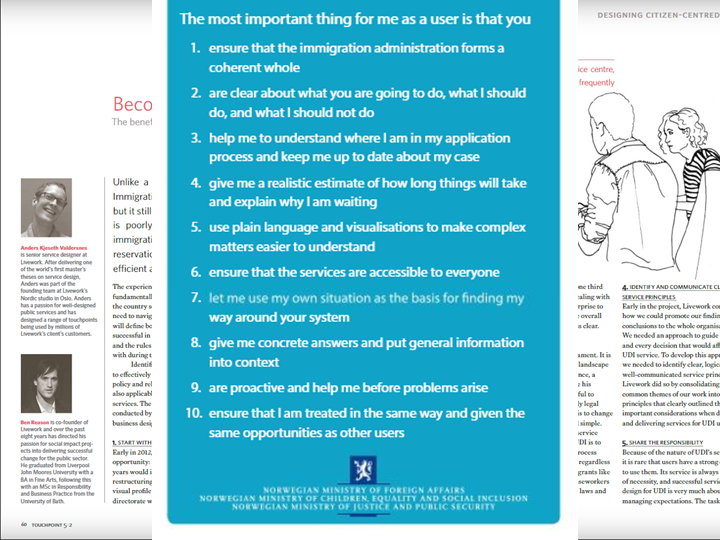
- During an organisational restructure, they wanted to use this opportunity to make the needs of service users at the forefront of initiatives across the organisation.
- They needed an approach that would guide each and every decision. So they consolidated what they had learnt about the needs of service users into 10 principles to give a clear guide on what matters to users.
Principles are often used in health care, though they might not always be described in this way. A few examples we have come across are:
- The list of actions in the Welsh Government’s (draft) Persistent Pain Framework
- ARMA’s Standards of Care
- The key statements in the IAPT-LTC implementation guidance
- NICE recommendations
We think we can build on these further, by bringing in specific experiences of people with mental health problems and persistent neck and back pain.
14:20 Session 3: Exploring service principles
It’s on to our final session today and we start with an introduction from Dom, who is Senior Design Manager at the Q Lab.
Starting the afternoon thinking about how we might use service principles to improve care for people with mental health problems and persistent pain #QLabs pic.twitter.com/SBHu8tc5IA
— Tracy Webb (@TracyWebb007) February 14, 2019
Firstly, why are we exploring using service principles?
Well the Q Lab is currently at the stage of translating research into practice – looking at how we might turn the insights into something useful for addressing the needs of people with mental health problems and persistent back and neck pain.
Making research useful is a key challenge in this phase of work – research and discovery. How do you make the research useful and useable?
What are service principles?
They are a distillation of findings on people’s needs – a list of key points to keep in mind when designing or delivering a service.
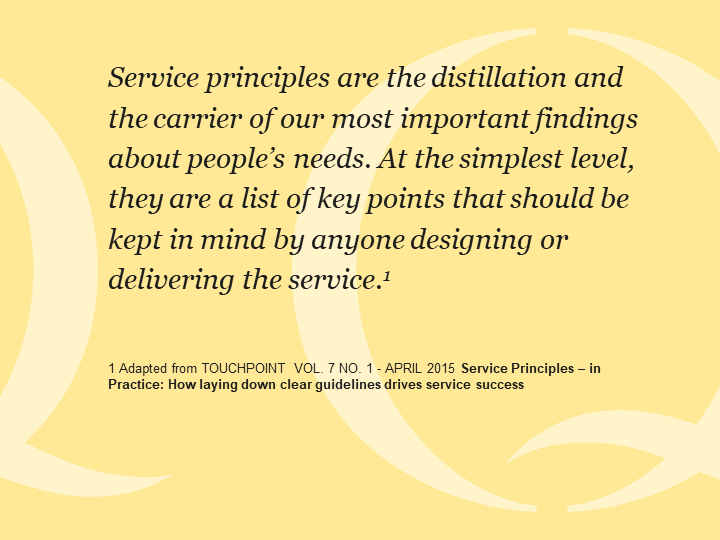 14:00 Post-lunch energy raiser
14:00 Post-lunch energy raiser
We’re back together and it’s everyone to their feet! It’s time for a quick energy raiser to get us ready for the final afternoon sessions.
Here’s how the merry-go-round works: With two equal groups facing each other in a circle, people are asked a series of questions and each person has 30 seconds to answer to the person opposite. After each question everyone takes a step to the right. You can check it out in action in the time-lapse video below!
-
-
- I know I’ve had a great day when….
- What gives me courage is….
- My favourite sandwich is…..
- A voice I need to stop listening to is…
- A courageous conversation we are not having is…
- The skill I most enjoy sharing is…
- What I want to learn from others today…
- If I was an animal I would be…
Energising for the afternoon with a merry-go-round (also called mad tea). It is a great way to facilitate networking and connections and is part of Liberating Structures toolkit (fun & inclusive ways to unleash creativity!): https://t.co/xAxYm7e0r4 #QLabs pic.twitter.com/2hn0voVKTP
— The Q Community (@theQCommunity) February 14, 2019
-
During the workshop – morning sessions
13:15 Lunchtime!
It’s time for a well-earned lunch break and a chance to refuel for the afternoon ahead. And if we’re lucky a walk and talk in the Birmingham sunshine!

12:55 What we’re hearing
Here are a few reflections from the testing site hosts and others on what we heard, and feedback from the wise crowds sessions.
Kay and Tom from Keele University
– The importance of lived experience and making sure these voices are heard.
– Developing information resources and making sure these are accessible for people.
– Identifying key stakeholders early on.
– Potentially getting a commissioner in the room and how this can be of benefit later down the line.
Kerry from the Robert Jones and Agnes Hunt Orthopaedic Hospital
– Ensuring you introduce people to one another.
– Keeping stories and narratives alive and how you balance of these elements.
Amy from the Health Innovation Network
– Language and the importance of language – talking about wellbeing rather than just mental health or physical health.
– Empower professionals to talk about these issues – recognising it’s not always easy, even if they’ve had training.
– Not always needing someone to be an expert, but having someone who knows how to navigate the system.
Owen and Clare from Powys Health Teaching Board
– Using peer support to empower people to make their own decisions.
– Again, developing resources and making sure these are accessible to everyone.
– There are similarities in learning for rural areas and densely populated cities.
– In Powys, the rural local is a driver but the issues are universal.
– Importance of having a suite of options – even though you might live near a GP, you may prefer to do it online. These options are sometimes limited.
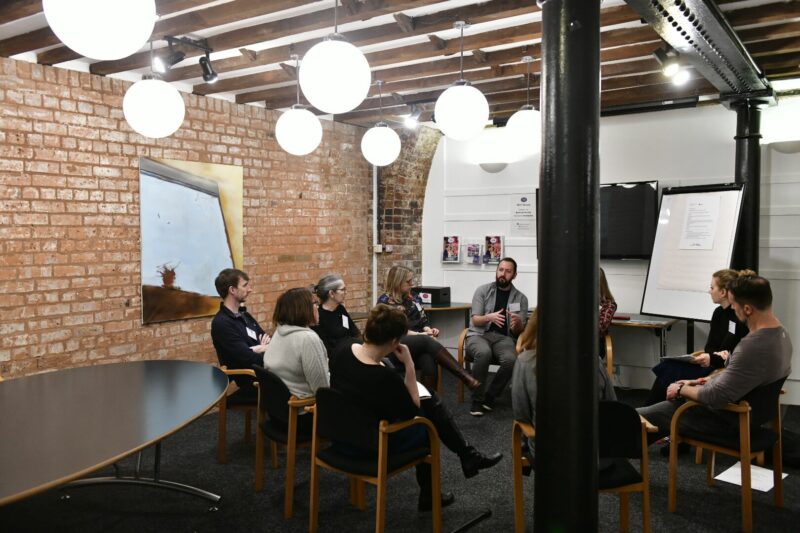
12:15 Wise words from wise crowds
Now we’ve heard from all four testing teams we are moving into an activity called ‘Wise Crowds’. It is a method taken from Liberating Structures and encourages people to share experiences and peer learning.
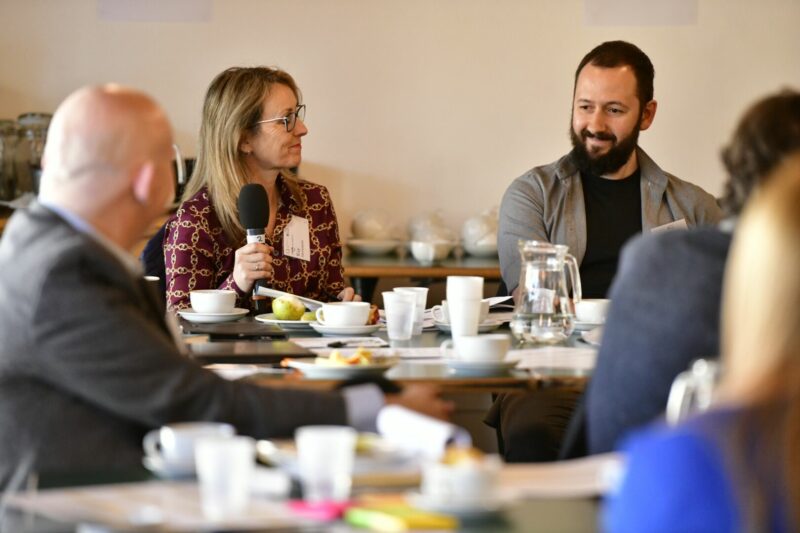
12:05 What the teams will be working on
We are now hearing a short pitch from each team as they introduce what they will be working on during testing and some of the challenges they are facing in their local contexts. They are also sharing the problem/s they would like help or advise on from other attendees today.
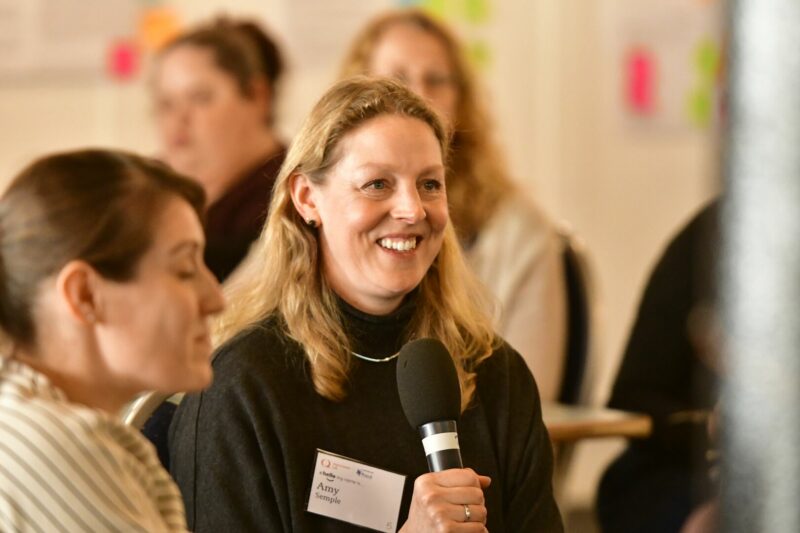
-
- Keele University working with Midland Partnership NHS FT – the importance of patients being informed about the biological, psychological and social interactions and impacts of co-morbid physical and mental health problems. Also the importance that healthcare professionals are confident and competent to work outside of their speciality (either physical or mental health), or at least identify opportunities to sign-post. How do they get clinicians (from different specialties) and patients working and learning together? How do we create a Community of Practice to support implementation?
- Health Innovation Network – how education and support is provided to physiotherapists in “tier 2” to deliver holistic care, to make sure patients are appropriately supported and managed between Tier 2/3. How do they adapt this approach to support people with mental health conditions?
How do they up-skill non-specialist professionals to talk about MSK health and mental health? - Powys Teaching Health Board in Wales – people having difficulty accessing pain education due to symptoms of their condition, logistics of travel and taking time off work. The low population density mean that it is often not cost effective to run regular community sessions and there are also issues with consistency of pain education within services. Understanding of what the barriers are to implementing the agreed management plan and how you pick people up who don’t engage in the process. How do you deliver pain education in a sparsely populated county? How do you make Shared Decision Making more meaningful and effective?
- Robert Jones and Agnes Hunt Orthopaedic Hospital – health services separate physical and mental health and the workforce are becoming more specialised. How do you influence a community to work together to make the difference for citizens immediately. What are the small things that will make the biggest difference that you can test?
Fantastic to hear about the #Qlabs testing sites that will be working to generate new interventions to look at neck and back pain and mental health. Bravo! pic.twitter.com/Kc5dAOCsBn
— Dale Webb (@dalewebb) February 14, 2019
11:55 Introducing the testing teams
Over the next 6 months we will be working with 4 organisations to develop and test ideas on the ground and share the learning widely with Lab participants and others.
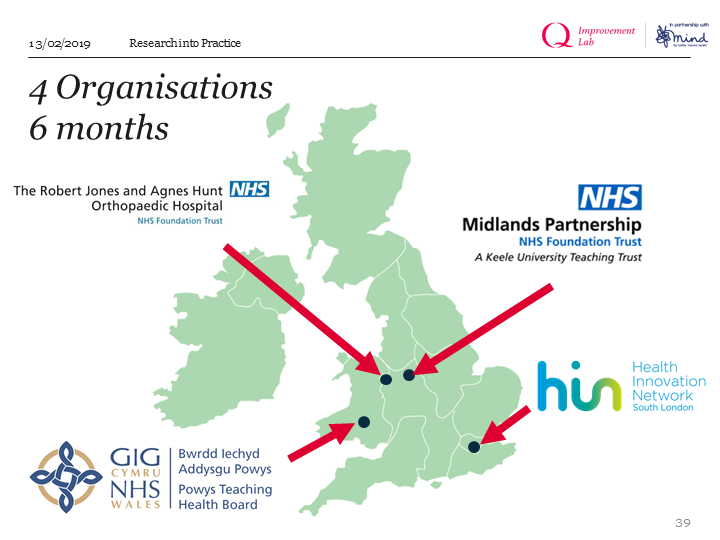
Here are the 4 teams will be working with:
Keele University with Midland Partnership NHS Trust – have extensive experience translating research into practice for people with MSK problems.
Health Innovation Network – have an established MSK programme and a newer mental health programme strand.
Powys Teaching Health Board in Wales – provides range of community pain services for a large rural population
Robert Jones and Agnes Hunt Orthopedic Hospital – a specialist secondary care setting in Shropshire with MSK provision.
11:50 Session 2: Developing and testing ideas – in conversations with test teams
After a quick break, we’re now back in the main room for the second session. Introducing the session is Anindita Ghosh, Innovation and Development Lead for the Q Lab.
We are now looking at how the insights and learning from the research can be used to generate ideas that can be developed and tested in practice. These give a useful framework for looking at how the issues play out in local contexts and how we can implement improvements.
Earlier this week we published a blog on developing and testing, to give a bit more context to our plans for the next 6 months. Including an introduction to the testing teams, who we excited to have with us here today!
11:30 Time to reflect
Before we head off for a well-earned coffee break, people are adding some individual reflections on to worksheets.
These reflections and other comments we receive today (both in the room and online) will be really valuable in helping us address any gaps and collaboratively develop the next iteration of the research.
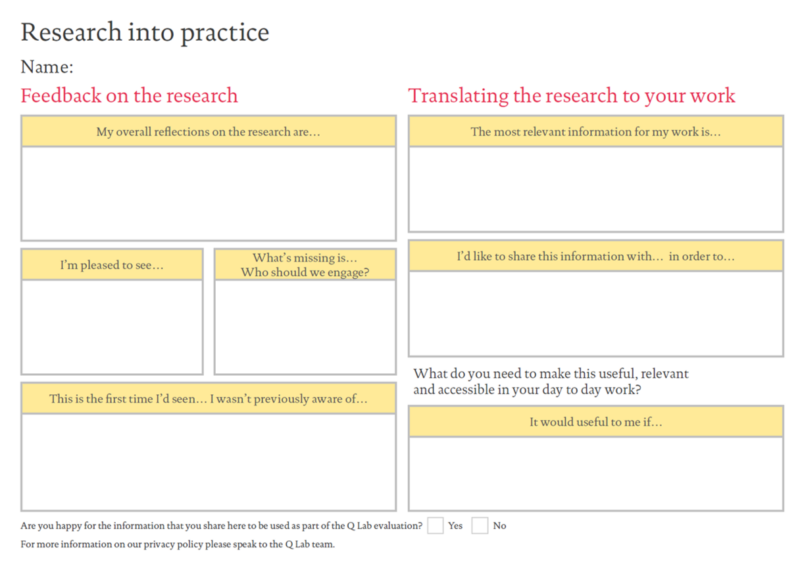
11:20 Reviewing the research
Great to see so much engagement with #QLabs research on persistent neck & back pain with mental health problems @theQCommunity @MindCharity pic.twitter.com/ylYCnvcbtD
— Sonal Mehta? (@sunlo100) February 14, 2019
There are lots of great discussions going on and of course, lots of post it notes! Really interesting to see the particular points people are in a agreement with and also less sure about. The post its go into a bit more detail about why.
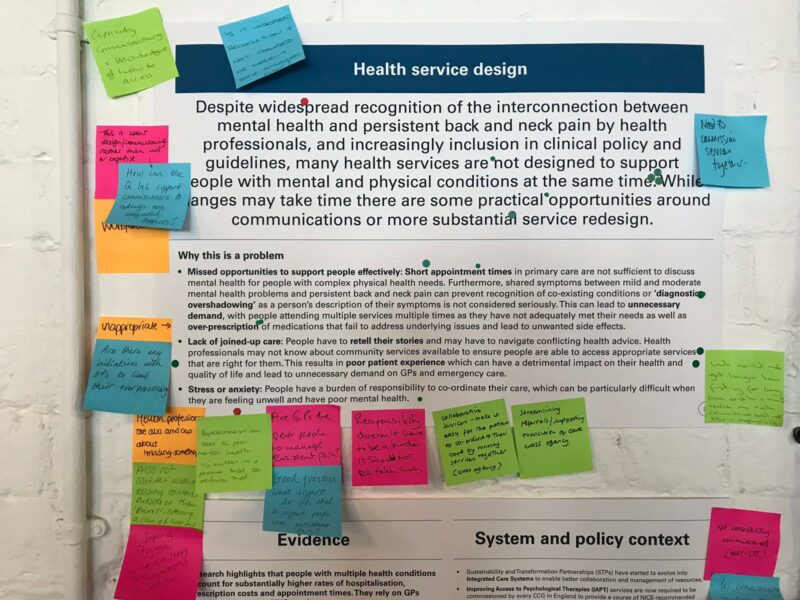
11:00 On to the ‘insight safari’
We are now taking some time to review an ‘insight safari’ of the research insights we’ve gathered so far.
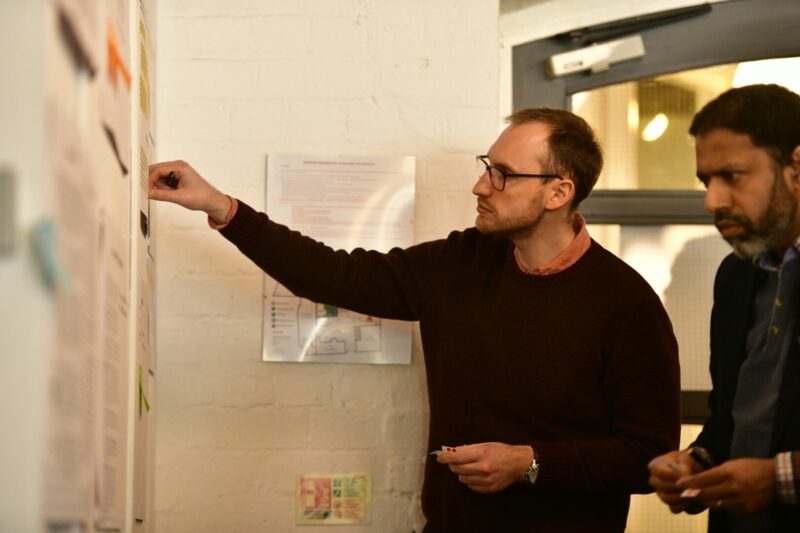
People are reading and reviewing the insights – adding green dots for what they agree with and red dots for anything they disagree with. We’re also encouraging people to add post it notes with comments they have.
The insights are also available on a virtual whiteboard, or as PDF to download.
Take a look at the research – what do you think? What do you agree with? What don’t you agree with? What’s missing?
You can add your thoughts to the online group or drop us an email and let us know QLab@health.org.uk
10:55 Emerging themes
So what have we been learning? Through the research, we have identified three high level themes emerging. These are:
- Understanding and education
- Health service design
- Workplaces
10:46 Session 1: Exploring the research insights
We’re now starting our first session of the day and introducing is Jo Scott, Insight Manager for the Q Lab.
Over the past three months the Q Lab and Mind have been working collaboratively with Lab participants and others on the research to get a rounded understanding of the topic.
How did we do this?
It was very much a joint effort! Thank you again to everyone who helped with and contributed towards the research. Here’s a quick overview of some of the activities we carried out:
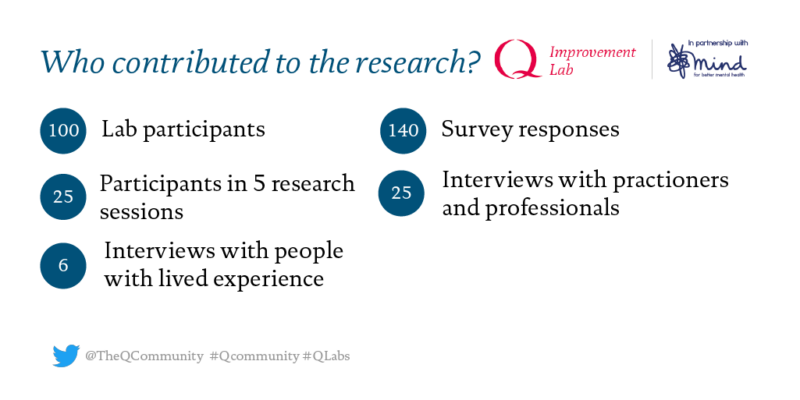
In the initial survey, we asked people to share their experiences and also examples of good practice already taking place. Theses responses helped to guide our desk research in the months after.
There are lots of great examples out there – we’ve pulled together a few resources of some examples below:
- Cheshire and Wirral Partnership NHS Foundation Trust – Triangle of Care
- Powys Teaching Health Board – Residential Pain & Fatigue Management Programme
- Health Innovation Network – Joint Pain Advice – A new model of care for chronic joint pain
- Keele University – STarT Back Screening Tool
- EEP Cymru – Health and Well Being Courses
10:35 Sharing and connecting
There’s now the opportunity for people to chat to someone they’ve not met before and have a conversation based on what they’re written down. We’ve also handed out individual ‘business cards’ today, as a way of people following up after the workshop.
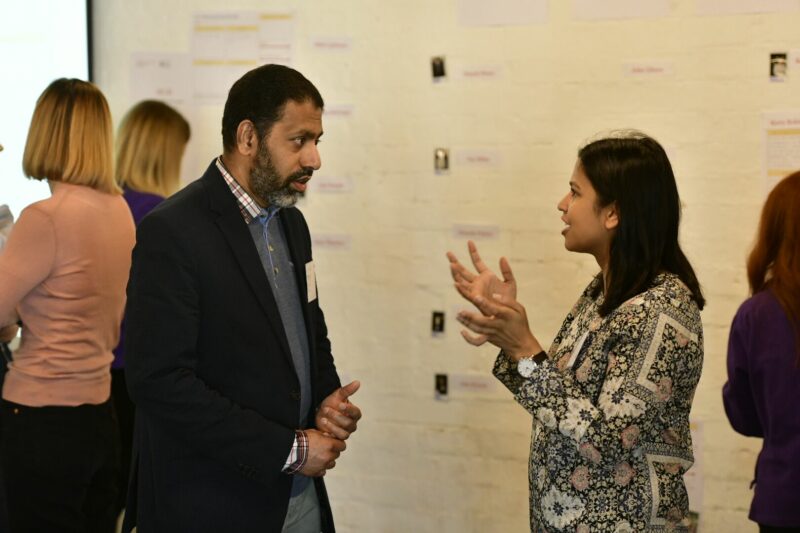
10:30 Getting to know each other
We’re in to our first activity and icebreaker this morning, as we encourage attendees to speak to and connect with someone they’ve not met before.
First, people are completing an activity sheet answering questions on what they’re looking forward to, a bit about themselves and what experience they bring.
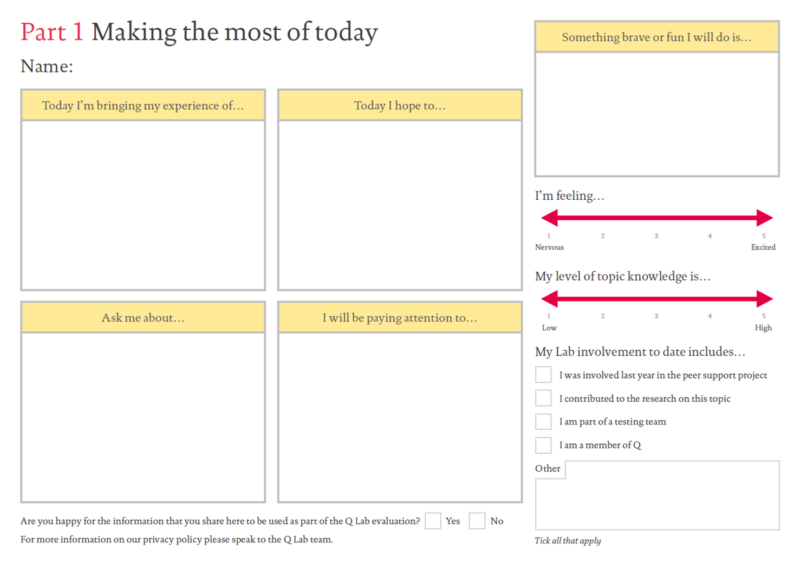
10:20 How we hope to achieve change
The Q Lab works on a single challenge for 12-months and brings together a diverse group of people to pool insights on a topic, uncover new insights, and develop and test ideas.
To better understand how we hope to achieve change through the Lab, you can take a look at the Lab impact model.
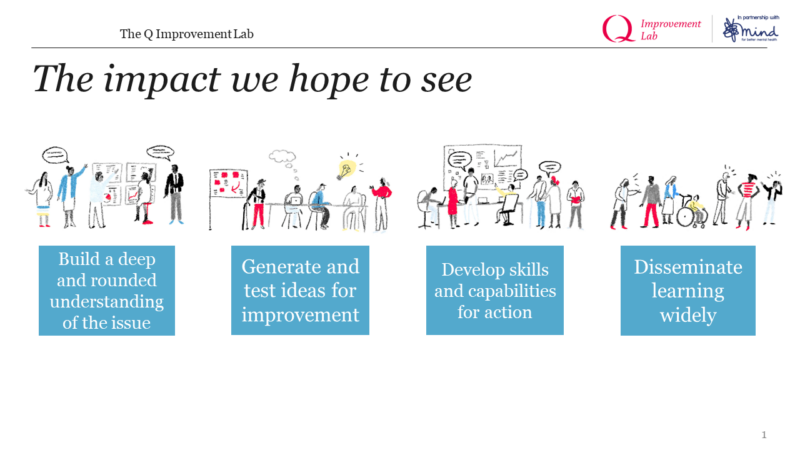
You can also read more about how the Lab hopes to achieve change in the Q Lab essay – Impact that counts.
10:12 The aims for today
As well as being a milestone for the Q Lab and Mind project, we also want our attendees to get the most from today. The workshop has been designed to meet three aims:
- To meet new people, have conversations and make new connections
- Learn more about the opportunities for how we can improve care and experiences for those of us with mental problems and persistent pain, and what we’re aiming for
- Trying out different activities and methods to help to tackle complex problems. If you want to find out about some of these, you can take a look at Q’s Creative Approaches to Problem Solving toolkit.
Today we also want to share and add to our collective knowledge of this topic that’s been coming together over the last few months. We also want to discuss this collective knowledge and how it can be used improve the experience of people experiencing mental health problems problems and persistent pain.
10:05 And we’re off!
We start with a welcome and introduction from Libby on why we are here today.
Today is an important milestone in the Q Lab and Mind project looking at the experiences of people living with both mental health problems and persistent back and neck pain, and how care can be designed to best meet their health and wellbeing needs.
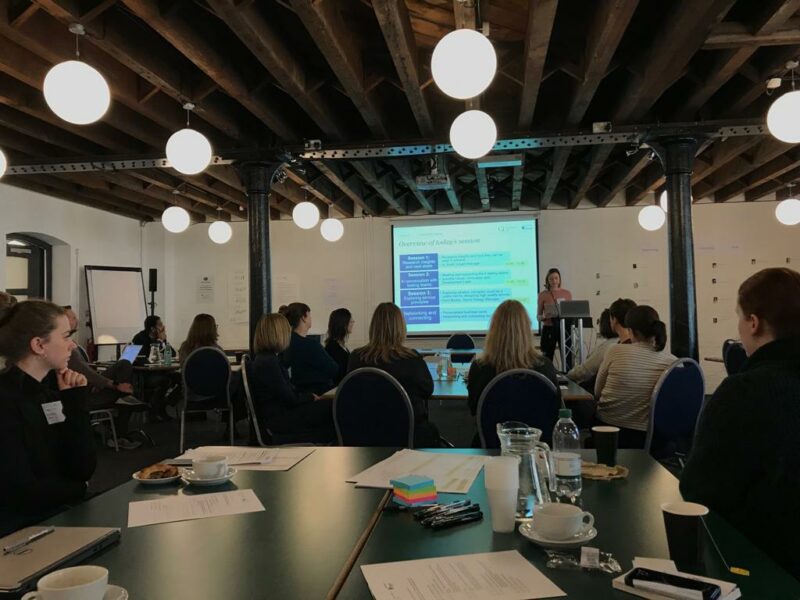
Why is this topic important?
We know it’s increasingly common and can have a huge impact on someone’s life. Here are a couple of key stats:
- 1 in 4 people in the UK will experience a mental health problem each year
- Back pain affects around 1 in 3 people each year.
You can also watch a short video below from Joanna Moss, Business Development Manager at Mind, on why we are working on this topic.
Why #QLabs focus on #mentalhealth & persistent pain? 1 in 4 people in the UK will experience a mental health problem each year and back pain affects around a third of the UK population each year. Many people experience both and there is a strong correlation between them. pic.twitter.com/FZylo8tbRv
— The Q Community (@theQCommunity) February 14, 2019
9:57 Why we’re here today
Libby Keck, Programme Manager for the Q Lab, shares why we’re here today and a few details on what we progress we hoping to achieve with the workshop.
So why are 30 people from across health, care and the #Qcommunity gathering in Birmingham today? @libbykeckhealth shares what we hope to achieve today to make progress on #Qlabs work with @MindCharity to improve care for people with #mentalhealth and persistent back and neck pain pic.twitter.com/RR7FwmuvbJ
— The Q Community (@theQCommunity) February 14, 2019
9:50 What’s coming up today
Registration is underway and the sun is shining in Birmingham! Here is a quick overview of what we have coming up on today’s agenda
10.00 – 10.45 Welcome and introduction, including networking and connecting activity #1
10.45 – 11.30 Session 1 – Mental health and persistent back and neck pain: Insights and next steps
11.45 – 13.15 Session 2 – Developing and testing ideas: In conversation with the testing teams
14.00 – 14.15 Networking and connecting activity #2
14.15 – 15.45 Session 3 – Exploring service principles
16.00 – 16.30 Close and next steps
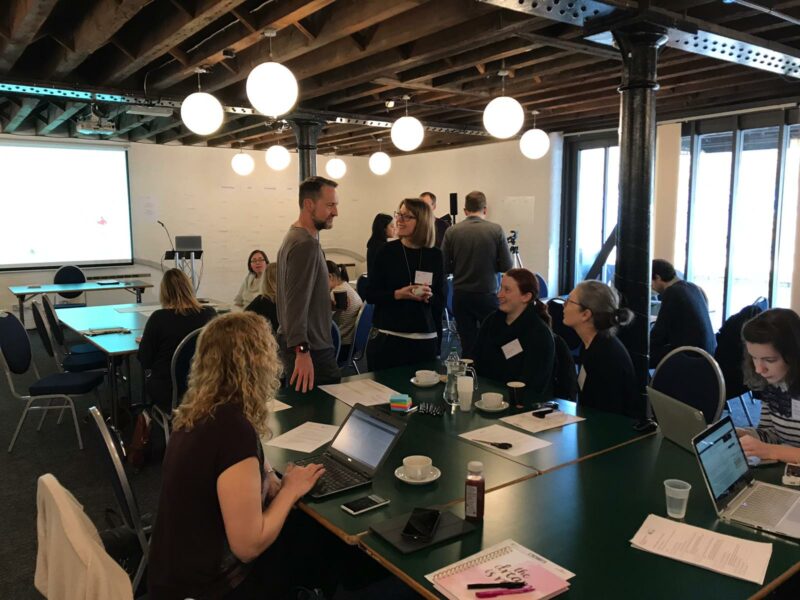
9:30 Registration
Our attendees are arriving and are grabbing a cup of coffee before we kick off at 10am.
Just a reminder that we are also taking over @theQCommunity Twitter today using #QLabs
Looking forward to participating in today’s @HealthFdn #qlab looking at persistent pain and mental health with other members of the @theQCommunity. Excited that @PTHBCLTCM @PTHBhealth has been chosen as a test site for some of the ideas generated.
— Owen Hughes (@OGRHughes) February 14, 2019
8:24: Morning Birmingham!

Before the workshop
13 February
15:20: Why mental health and persistent pain?
Throughout the workshop on the 14th we’ll be sharing the research, evidence and stories about why this topic is important and the impact this has on people’s lives.
In a nutshell, 1 in 4 people in the UK will experience a mental health problem each year and back pain affects around a third of the UK population each year. Many people experience both and there is a strong correlation between them.
Take a look at Sonal’s story about why mental health and persistent back and neck pain is important to her:
And why this topic is important to our partners, Mind:
11 February 2019
13:20: Welcome everyone!
The workshop is three days away and the Lab and Mind teams are doing the final preparations.
If you’re new to the Q Lab, or to the Q Community and are interested in mental health and persistent pain, here is some back ground information that might be of interest:
Have only 90 seconds spare? Watch this short introduction to the Lab:
Have 8 minutes spare? Read this essay outlining how the Q Lab came about, what we do and how we work
Comments
Deepak Ravindran 16 Feb 2019
This is a fantastic and very informative blog post and I am sorry that I couldnt be there for this day. Hopefully I can come for another workshop later in the year if it is being planned. I have been part of the IPASS group that was listed in the Research findings Page 12 so it would have been useful to see some of the overall insights into what is translatable into other areas. I also think that if we are talking about education and raising awareness and understanding then introducing trauma informed practice is a vitally useful way of bringing both physical and mental models together.
Jo Scott 21 Feb 2019
Hi Deepak, thanks for your comments, which I'll add to the feedback we received on the day. It would be great if I could follow up with you about the IPASS work, as I will be developing the good practice examples following the comments and feedback we have received so far.